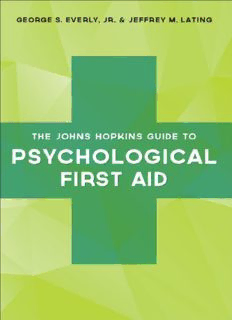
The Johns Hopkins Guide to Psychological First Aid PDF
Preview The Johns Hopkins Guide to Psychological First Aid
THE JOHNS HOPKINS GUIDE TO PSYCHOLOGICAL FIRST AID THE JOHNS HOPKINS GUIDE TO PSYCHOLOGICAL FIRST AID GEORGE S. EVERLY, JR. Johns Hopkins University JEFFREY M. LATING Loyola University Maryland © 2017 Johns Hopkins University Press All rights reserved. Published 2017 Printed in the United States of America on acid-free paper 9 8 7 6 5 4 3 2 1 Johns Hopkins University Press 2715 North Charles Street Baltimore, Maryland 21218-4363 www.press.jhu.edu Library of Congress Cataloging-in-Publication Data Names: Everly, George S., Jr., 1950– | Lating, Jeffrey M. Title: The Johns Hopkins guide to psychological first aid / George S. Everly, Jr., PhD., A.B.P.P., Johns Hopkins University, Jeffrey M. Lating, Ph.D., Loyola University Maryland. Other titles: Guide to psychological first aid Description: Baltimore : Johns Hopkins University Press, 2017. | Includes bibliographical references and index. Identifiers: LCCN 2016040195| ISBN 9781421422718 (pbk. : alk. paper) | ISBN 9781421422725 (electronic) | ISBN 1421422719 (pbk. : alk. paper) | ISBN 1421422727 (electronic) Subjects: LCSH: Crisis intervention (Mental health services) | Psychiatric emergencies. | Stress (Psychology)—Prevention. Classification: LCC RC480.6 .E91145 2017 | DDC 616.89/025—dc23 LC record available at https://lccn.loc.gov/2016040195 A catalog record for this book is available from the British Library. Special discounts are available for bulk purchases of this book. For more information, please contact Special Sales at 410-516-6936 or [email protected]. Johns Hopkins University Press uses environmentally friendly book materials, including recycled text paper that is composed of at least 30 percent post-consumer waste, whenever possible. To the pioneers who gave birth to the field of disaster mental health . . . what an amazing journey it has been. We didn’t always get it right at first, but we kept trying until we did. And to Patricia Copps Everly and our mutual renaissance! Thank you! (GSE) To all those who have taught me so much about the field of disaster mental health. It is a privilege to be able to share what I have learned. To George Lating, for your willingness to always be there and listen. And to Austin and Jenna, who are the source of my greatest joy. (JML) CONTENS Preface | How Did We Get Here? Acknowledgments PART I. PSYCHOLOGICAL FIRST AID | THE SCIENCE 1. Psychological First Aid | Definition and History Defining Psychological First Aid Development of the PFA Concept PFA PFA Recommended Core Competencies of PFA Validation of the Johns Hopkins RAPID PFA Model Key Point Summary References 2. Psychological Consequences of Trauma | What You Will Encounter in the Field Posttraumatic Stress Disorder Depression Generalized Anxiety Panic Disordery Substance Use Psychophysiological Stress Syndromes Key Point Summary References 3. In the Wake of Disaster | The Large-Scale Context for PFA Types of Disasters Natural Disasters Technological Disasters Human-Made Disasters War-Related Syndromes: A Special Case of Human-Made Disaster Factors That Increase Severity Key Point Summary References PART II. PSYCHOLOGICAL FIRST AID | PRACTICING THE ART 4. R—Establishing Rapport and Reflective Listening First Things First: The Practice of Presence Empathy and Rapport The Empathic Cascade: The Bridge from Rapport to Adherence Historical Development Mechanisms of Action Demonstration of the R in RAPID Model Key Point Summary References 5. A—Assessment | Listening to the Story Screening Appraisal Cognitive Indicia Emotional Indicia Behavioral Indicia Spiritual Indicia Physiological Indicia Demonstration of the A in RAPID Model Key Point Summary References 6. P—Psychological Triage | Prioritization Urgency! Psychological or Behavioral Instability: The Crisis Triad Putting It All Together: The A-B-C Model of Psychological Triage Demonstration of the P in RAPID Model Key Point Summary References 7. I—Intervention Tactics to Stabilize and Mitigate Acute Distress Explanatory Guidance Anticipatory Guidance Cognitive Reframing Stress Management Instillation of a Future Orientation—Hope Enlisting the Support of Family and Friends Delay Making Any Life-Altering Decisions/Changes Faith-Based Intervention in PFA When in Doubt . . . Caution! Demonstration of the I in RAPID Model Key Point Summary References 8. D—Disposition and Facilitating Access to Continued Care Where Do We Go from Here? Encouragement Resources Demonstration of the D in RAPID Model Follow-Up and Disposition Key Point Summary References 9. Self-Care | Taking Care of Others Begins (and Ends) with Taking Care of Yourself The Need for Self-Care Terminology Risk Factors Self-Care Developing a Plan
